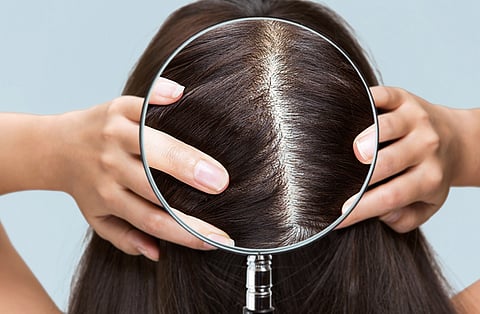
- LIFESTYLE
- FASHION
- FOOD
- ENTERTAINMENT
- EVENTS
- CULTURE
- VIDEOS
- WEB STORIES
- GALLERIES
- GADGETS
- CAR & BIKE
- SOCIETY
- TRAVEL
- NORTH EAST
- INDULGE CONNECT

Living in India is stressful enough with varied climatic conditions and the day-to-day work stress just adds on to it. There is a lot of chatter about how stress is bad for your mental health, but what you may not know is that it is particularly bad for your hair and scalp. It may come as a surprise to you but your scalp health could be reacting to stress as much as your skin, digestion, or sleep.
Stress is not limited only to your mind, but eventually it will weigh on your head. Stressful situations trigger our bodies to produce greater amounts of cortisol, which is referred to as the “stress hormone”. This excess of hormone might interfere with the normal hair growth cycle. Normally, a person’s hair grows, rests, and then sheds in a consistent cycle.
But when stress occurs, it can forcefully push hair into the shedding phase: A state known as telogen effluvium. This frequently causes noticeable thinning of hair or increased hair fall several weeks after a stressful period. Even though hair fall is usually temporary, it can be distressing and significantly worsen anxiety, creating a cycle of worsening stress.
Aside from hair loss, stress is also associated with some scalp issues such as dandruff, seborrheic dermatitis, and psoriasis. These conditions are known to be inflammatory and tend to worsen in the presence of emotional or physical stress. The reason being, stress increases one’s susceptibility to infection and disturbs the skin’s immune system, thereby rendering the scalp more vulnerable to irritants, dryness, itching and inflammation.
Many people are known to report exacerbated flaking and inflammation during emotionally challenging times. Stress can also impact scalp care in the sneaky way of anxiety-based subconscious actions like hair pulling or scratching. These behaviors are known as trichotillomania, which, if untreated, can cause long-lasting damage to the scalp and patchy alopecia.
Cribbing about the problem won’t help until and unless you take measures to control it. Therefore, along with understanding the problem, we have listed down a few practices to help you reach your hair goals.
Manage stress holistically
Now this goes personal for every individual according to their liking. By practicing mindfulness which includes meditation, deep breathing and yoga, your cortisol levels will get lower. It will eventually result in less inflammation that heavily affects your scalp health. Keep your body up and moving, which will boost your blood circulation. And definitely try to achieve 7- 9 hours of quality sleep every night to help your body and scalp regenerate and repair.
Watch what you eat
No amount of cosmetic treatments can help unless you adopt clean eating habits internally. Include foods rich in iron, zinc, biotin, omega 3 fatty acids, and protein to support hair follicle health and grow rapidly. And always remember to stay hydrated as dehydration can dry out your scalp and worsen flakiness.
Adjust your hair care habits
Seek out soothing components that lessen inflammation, such as tea tree oil, chamomile, or aloe vera.Use soft, clean formulas instead of sulfates and parabens, which can cause additional stress on your scalp.Reduce the amount of heat styling you do because too much heat might dry out your scalp. If necessary, use heat protectant sprays and let your hair air dry. And lastly, try to include natural oils for your scalp massages (homemade oils are the best).
Address underlying issues
Don’t take hair loss as a casual phenomenon rather, try to understand your personal underlying issue and consult a dermatologist if needed. Use medicated shampoos if needed, ingredients like ketoconazole or salicylic acid can help.
(By Suchismita Maity)